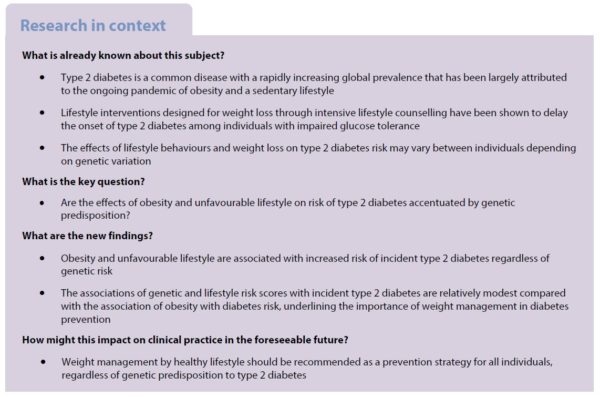Obesity is a critical risk factor for type 2 diabetes, regardless of genetics

Obesity increases the risk of developing type 2 diabetes by at least 6 times, regardless of genetic predisposition to the disease, concludes research published in Diabetologia (the journal of the European Association for the Study of Diabetes [EASD]). The study is by Dr Theresia Schnurr and Hermina Jakupović, Novo Nordisk Foundation Center for Basic Metabolic Research, Faculty of Health and Medical Sciences, University of Copenhagen, Denmark, and colleagues.
Using data from a case-cohort study nested within the Diet, Cancer and Health cohort in Denmark, the authors examined the joint association of obesity, genetic predisposition, and unfavourable lifestyle with incident type 2 diabetes (T2D). The study sample included 4729 individuals who developed type 2 diabetes during a median 14.7 years of follow-up, and a randomly selected cohort sample of 5402 individuals (the control group).
The mean age of all participants was 56.1 years (range 50-65) and 49.6% were women. Overall, 21.8% of all participants were classified as obese, 43.0% as overweight and 35.2% as having normal weight; and 40.0% of the participants had a favourable lifestyle, 34.6% had an intermediate lifestyle and 25.4% had an unfavourable lifestyle.
Genetic predisposition was quantified using a genetic risk score (GRS) comprising 193 known type 2 diabetes-associated genetic variants and divided into 5 risk groups of 20% each (quintiles), from lowest (quintile 1) to highest (quintile 5) genetic risk. Lifestyle was assessed by a lifestyle score composed of smoking, alcohol consumption, physical activity and diet. Statistical modelling was used to calculate the individual and combined associations of the GRS, obesity and lifestyle score with developing T2D.
Compared with people of normal weight, those with obesity were almost six times more likely to develop T2D, while people who were overweight had a 2.4 times increased risk. For genetic risk, those with the highest GRS were twice as likely to develop T2D as those with the lowest, while those with the unhealthiest lifestyle were 18% more likely to develop T2D than those with the healthiest.
Individuals who ranked high for all three risk factors, with obesity, high GRS and unfavourable lifestyle, had a 14.5 times increased risk of developing T2D, compared with individuals who had a normal body weight, low GRS and favourable lifestyle. Notably, even among individuals with a low GRS and favourable lifestyle, obesity was associated with 8.4 times increased risk of T2D compared with normal weight individuals in the same genetic and lifestyle risk group.
The authors conclude: “The results suggest that type 2 diabetes prevention by weight management and healthy lifestyle is critical across all genetic risk groups. Furthermore, we found that the effect of obesity on type 2 diabetes risk is dominant over other risk factors, highlighting the importance of weight management in type 2 diabetes prevention.”
Read the full article here.
All News